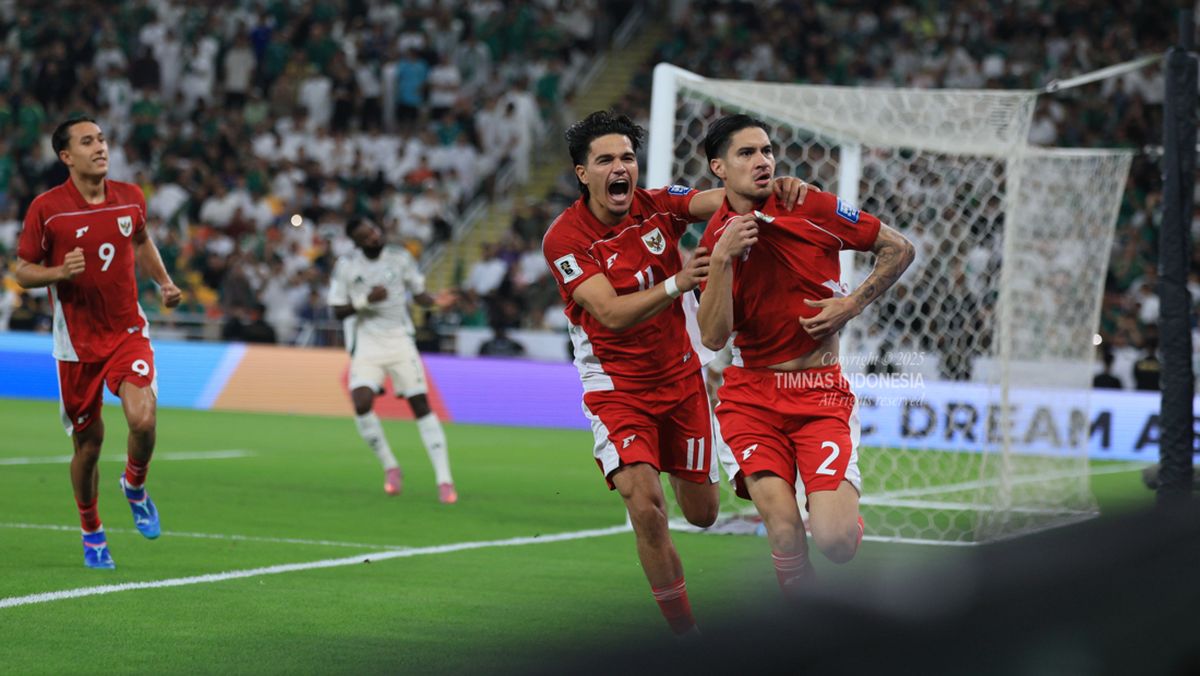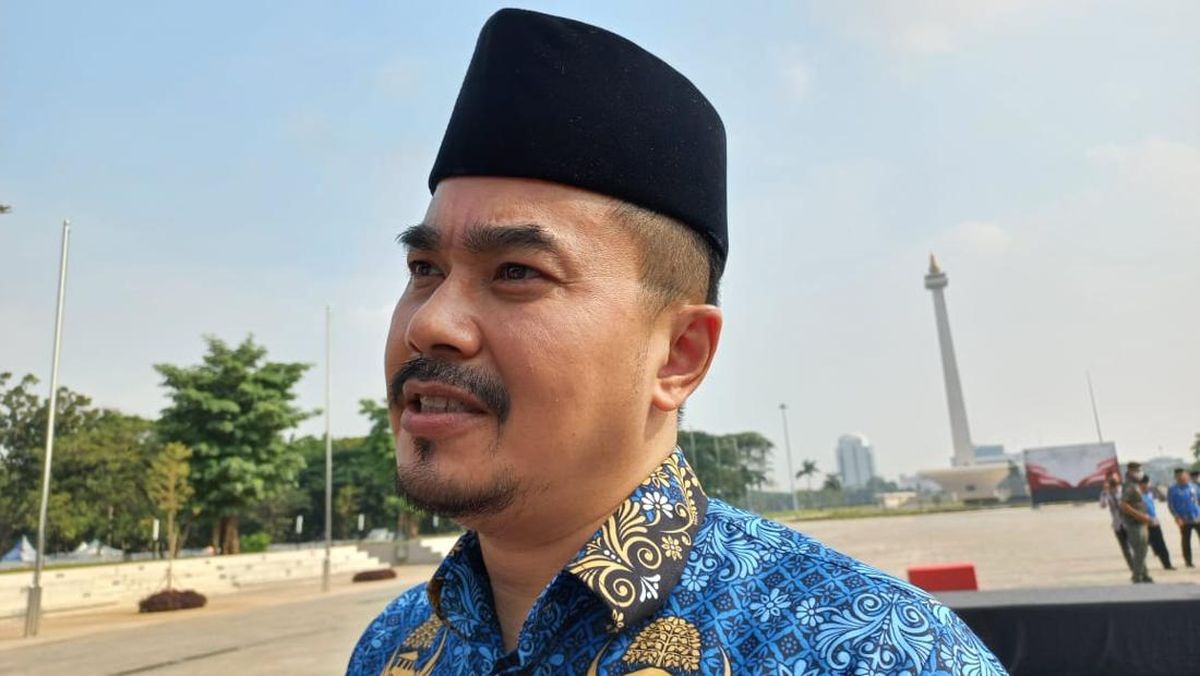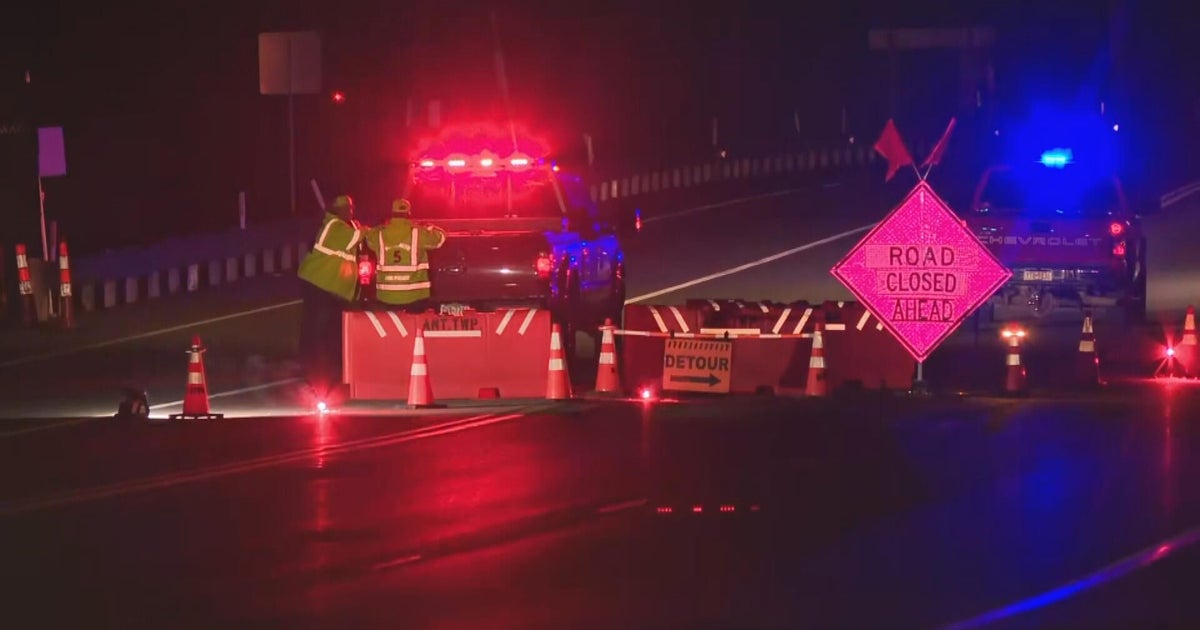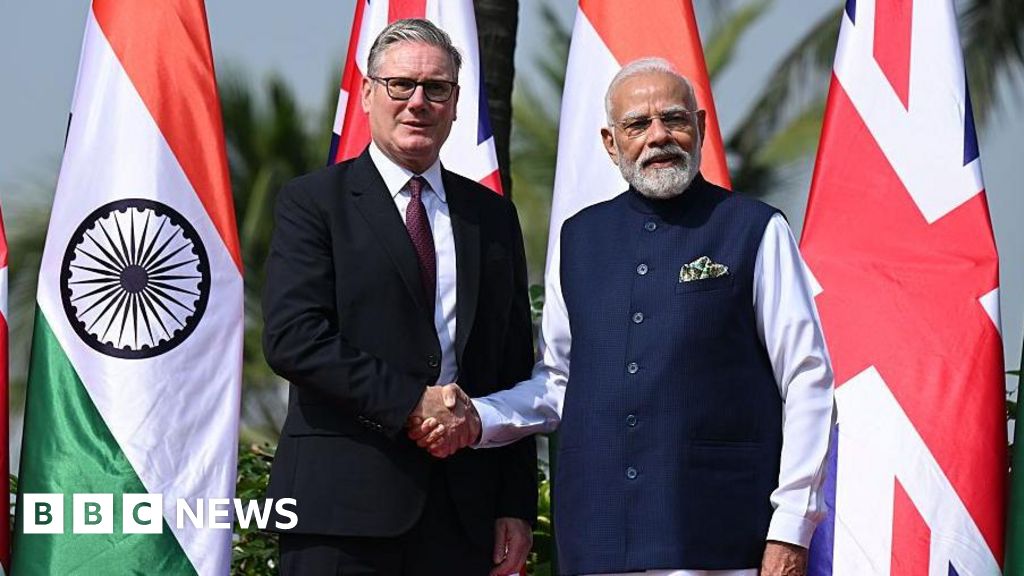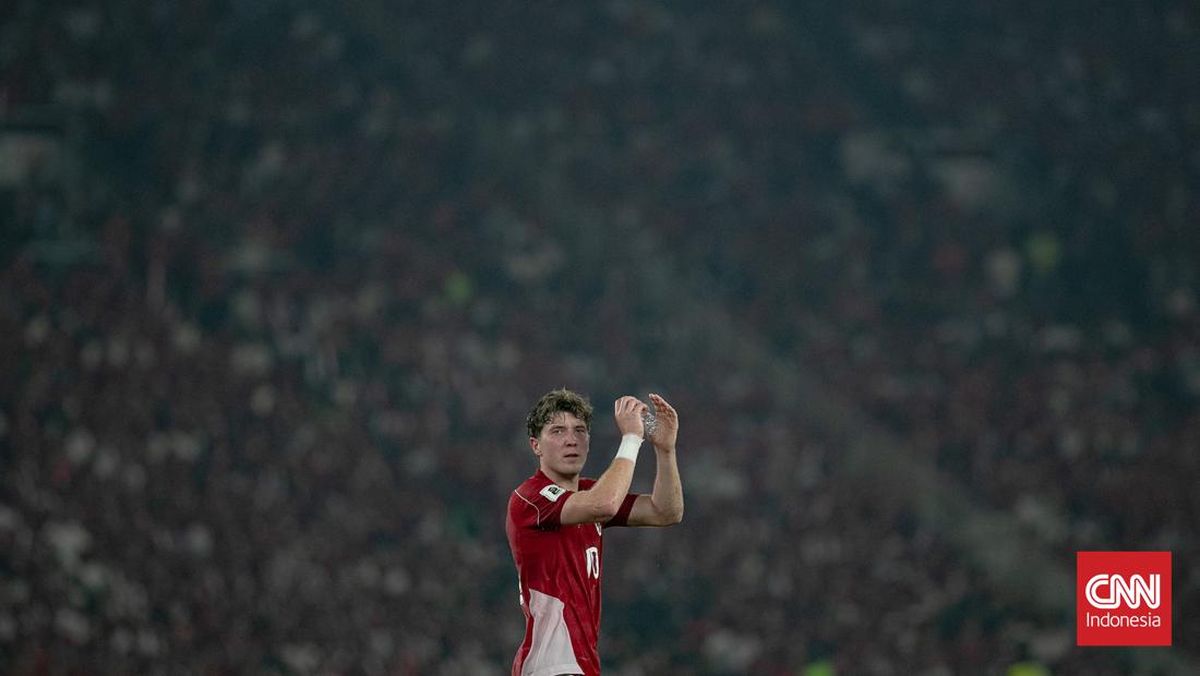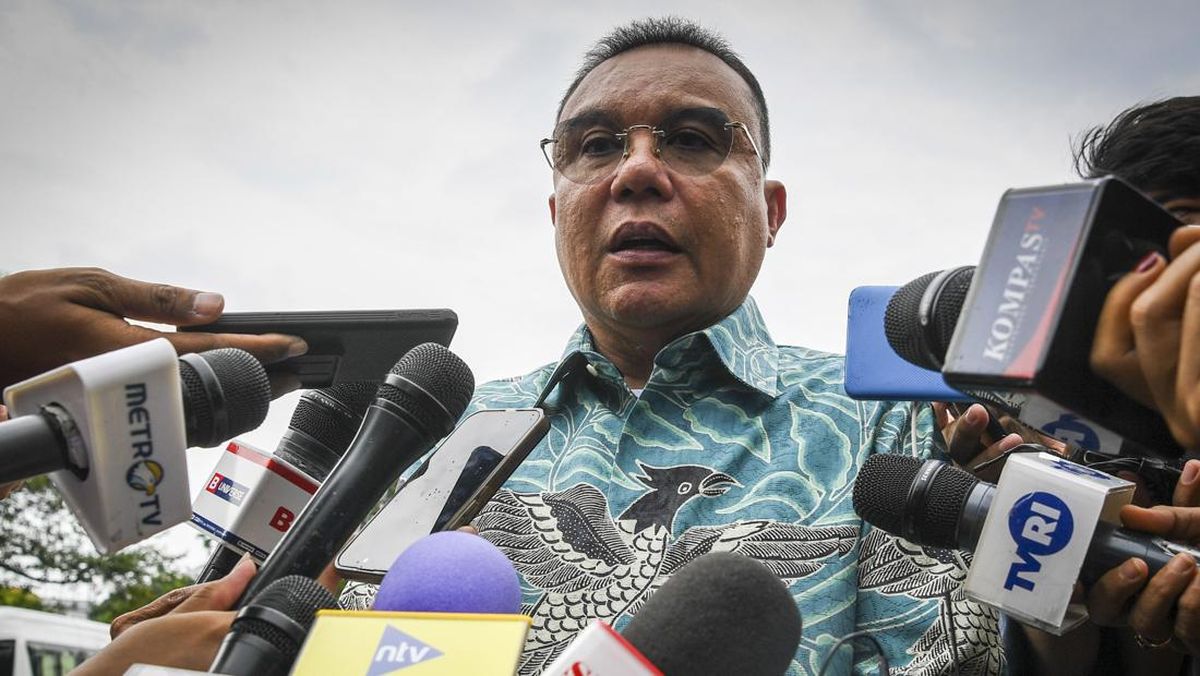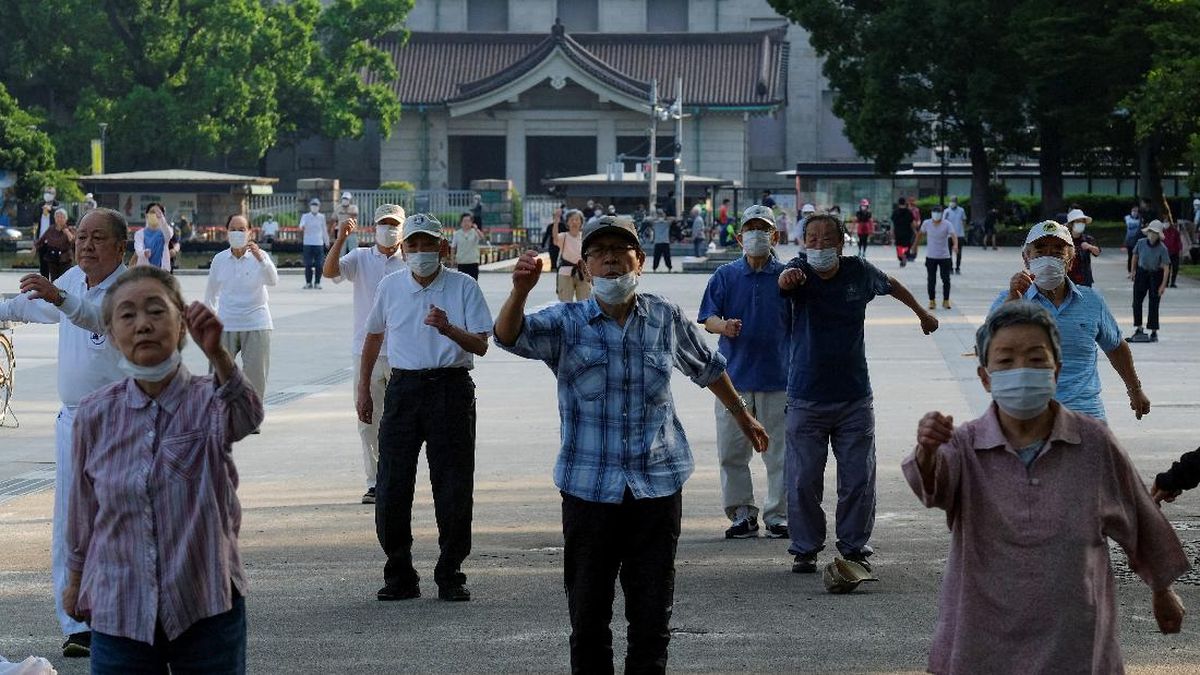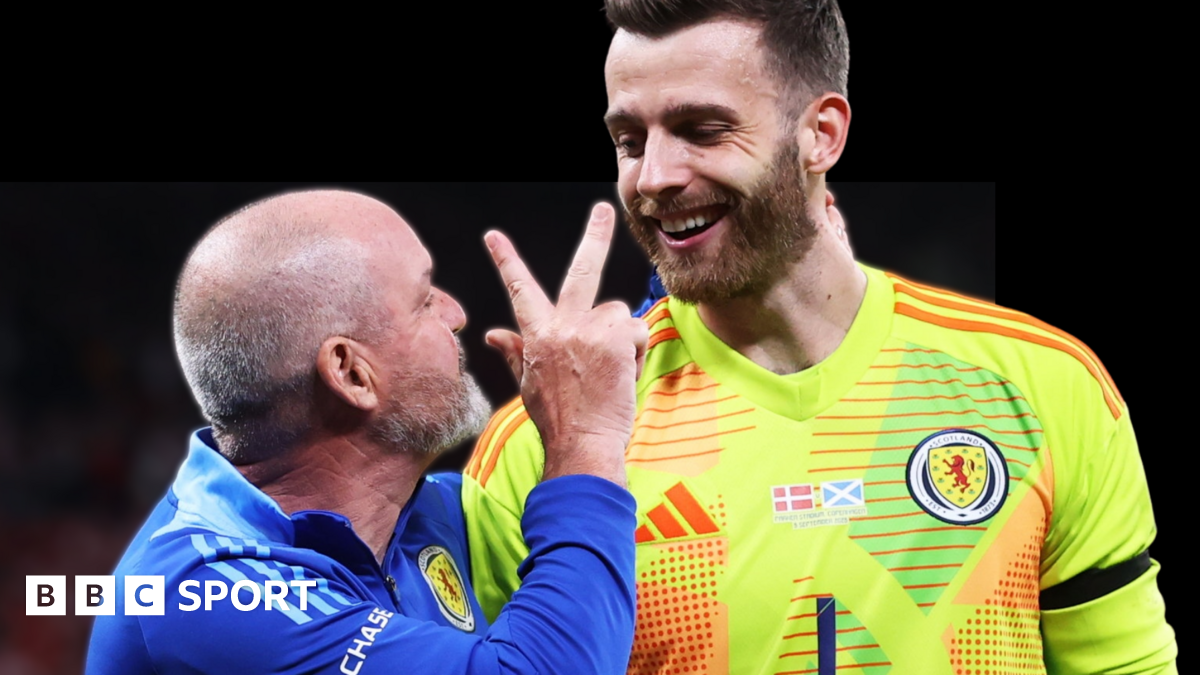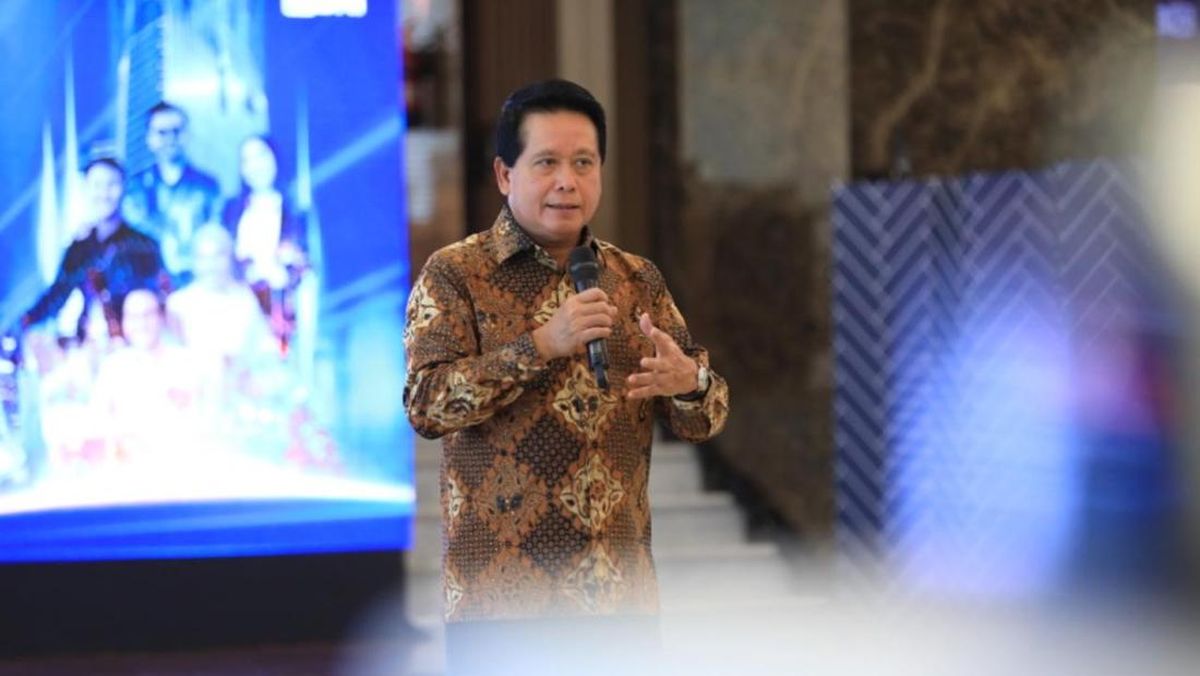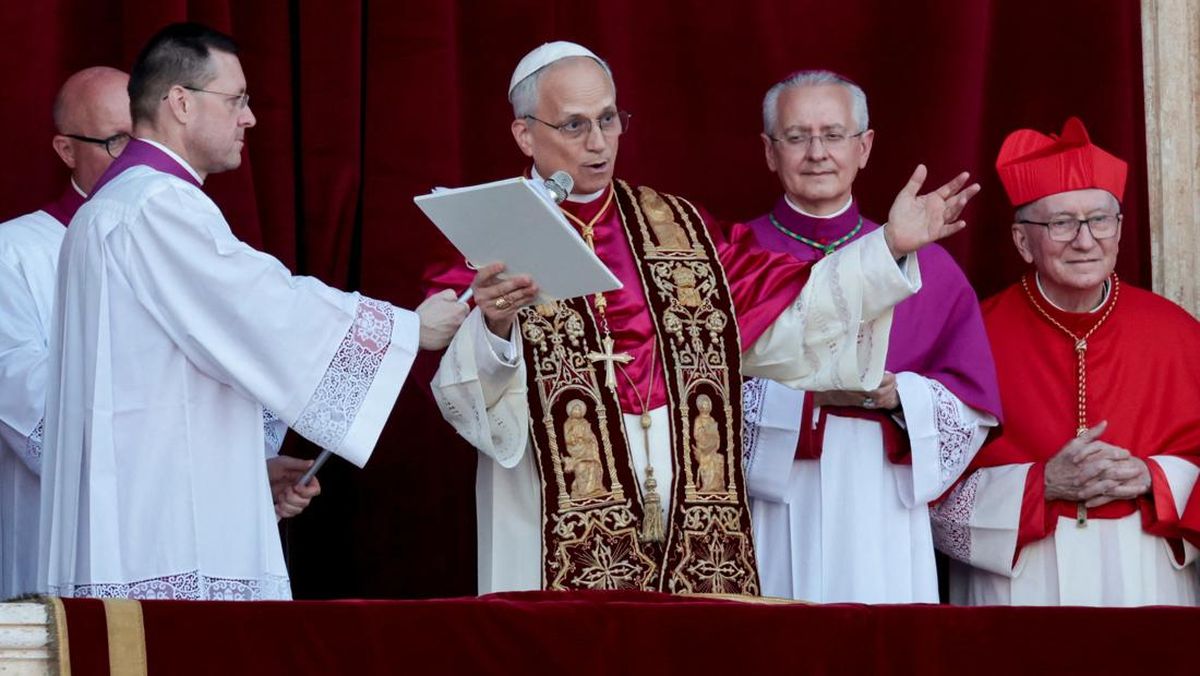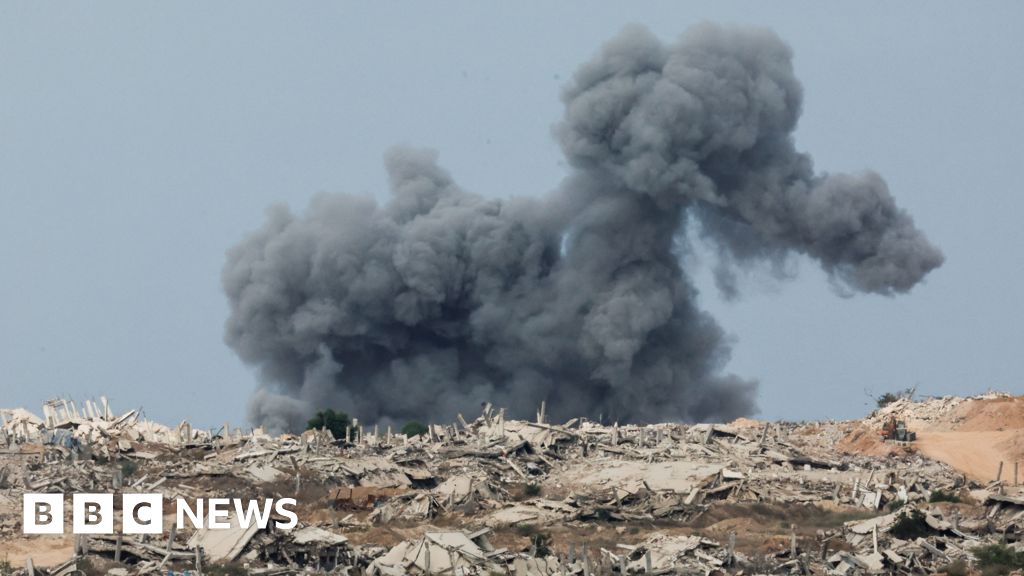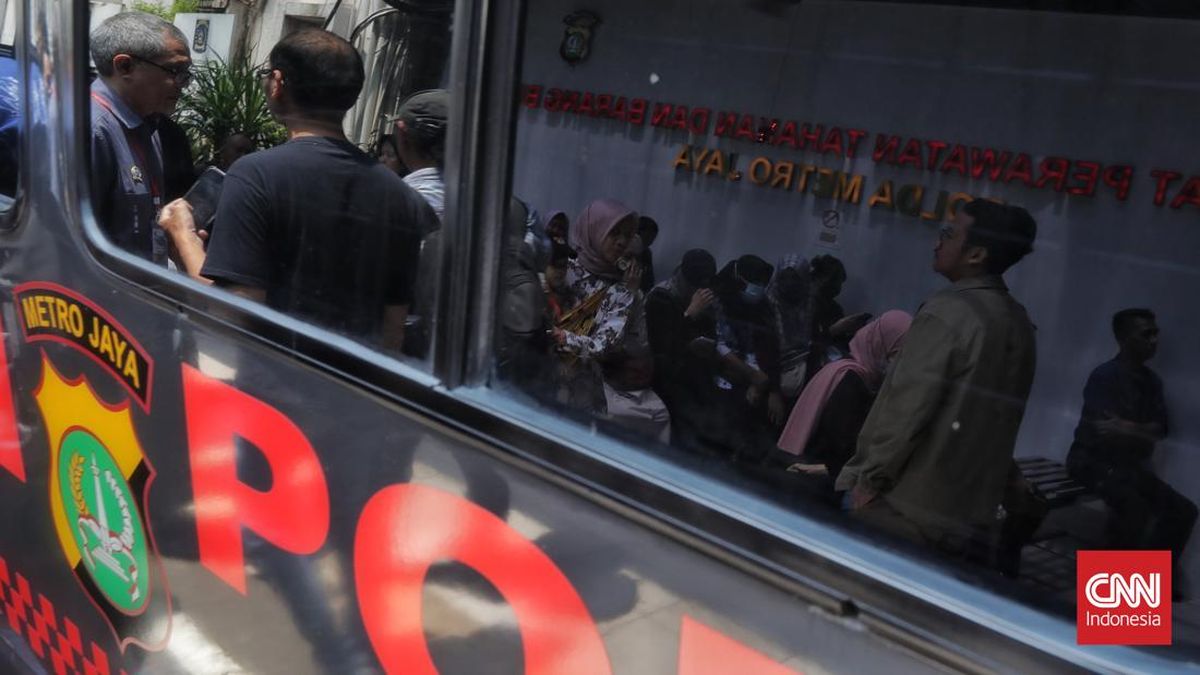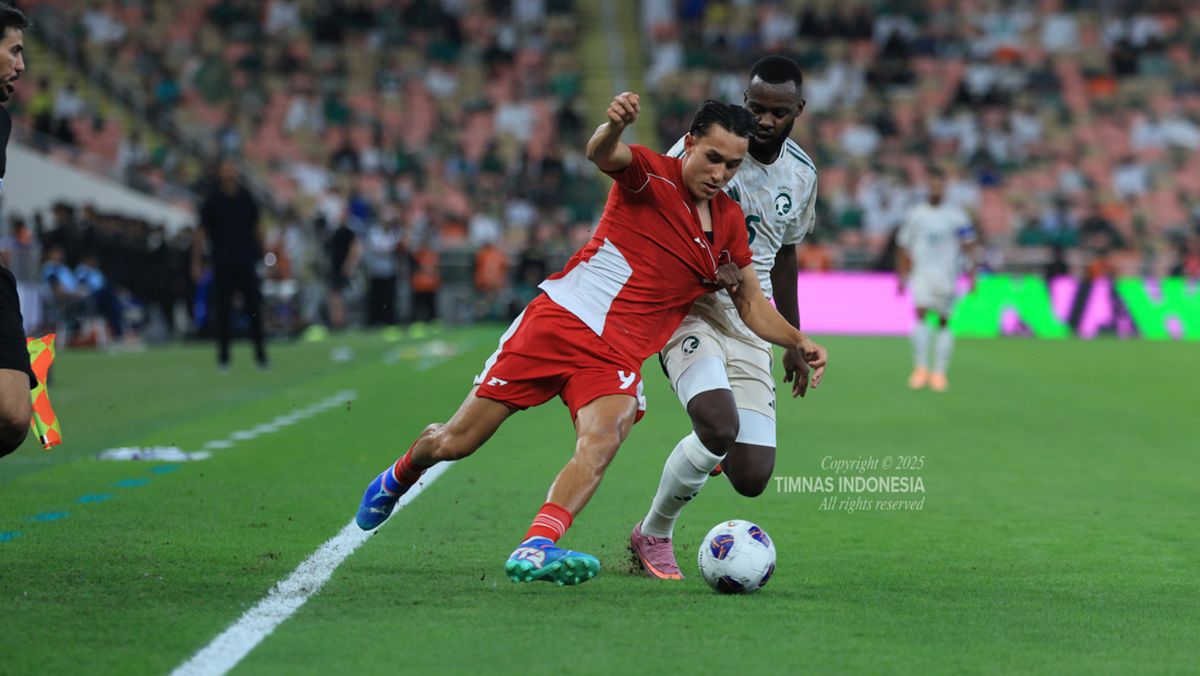James CookScotland editor

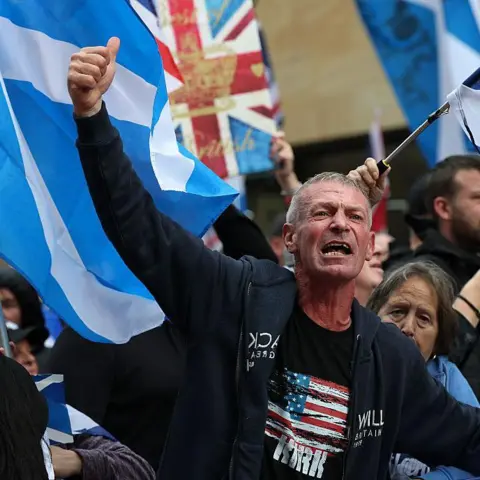 Getty Images
Getty Images
Something has shifted in Scotland.
The saltire, which was long embraced by supporters of Scottish independence, has now been unfurled for a different cause.
Up and down the land, the blue and white of St Andrew is fluttering from lampposts and being waved alongside the union flag at anti-immigration protests.
Until recently those two standards were more often seen on different sides of the debate about Scotland's future.
Now the saltire's presence is generating controversy of its own at demonstrations from Perth to Aberdeen and from Glasgow to Falkirk, where the latest rally was held on Wednesday evening.
This battle for Scotland's flag is also a battle about what it means to be a patriot in modern Scotland - a battle of competing nationalisms.

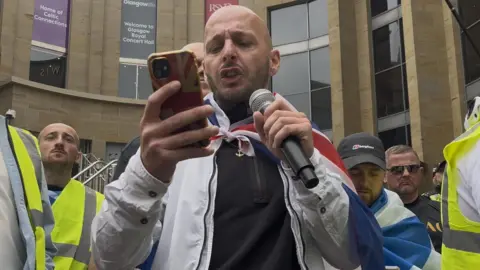
Steven Rennie addresses a rally outside Glasgow Royal Concert Hall
Steven Rennie is one of the prominent figures in these recent protests.
He blends opposition to independence and immigration with sharp criticism of the Scottish National Party - which is in favour of both.
I stood within a few feet of Mr Rennie as he addressed hundreds of supporters in the centre of Glasgow in late September.
With his shoulders wrapped in the red, white and blue of the union flag, he spoke of the saltire.
"They claimed our national flag as their own and for 12 long years we've allowed them to wield it as a weapon of division and hate.
"But no more. We have reclaimed our flag, our identity, our pride and also our resolve," he said.
Those on opposing sides of the debate have made their feelings known at protests
The crowd - separated from hundreds of counter-protesters by a line of police officers - cheered the denunciation of the SNP whose leaders, in a referendum 11 years ago, failed to persuade a majority of Scottish voters to opt to leave the UK.
"The SNP has wreaked havoc on our nation, dismantling our prosperity and our potential at every turn, replacing us with new Scots and putting our own people at the bottom of the pile," said Mr Rennie.
"New Scots" is a welcoming term used by Scottish government ministers who are keen to attract more foreign workers to help grow an economy which is challenged by a record low birth rate.
The SNP has run the devolved government in Edinburgh since 2007 but immigration remains the responsibility of the UK government in London - and it has rejected calls for a separate Scottish visa system.

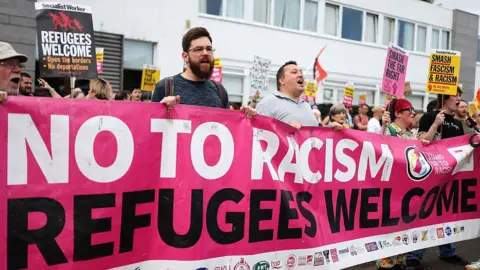 Getty Images
Getty Images
There was a counter-protest to the demonstration on Falkirk in August
Migration is a thorn in the side for Labour Prime Minister Sir Keir Starmer and appears to be rising up the agenda ahead of the Scottish parliamentary elections next spring.
The small boats crisis and the accommodation of asylum seekers in hotels, which Sir Keir has promised to phase out, have fuelled demonstrations around the UK.
That includes protests in Falkirk, where a building which was once a three-star hotel is being used to house migrants.
One protester, who gave his name as Mark, held a union flag emblazoned with "Stop the Boats".
He said politicians should be fixing ailing public services, not spending taxpayers' money on medical and dental care for asylum seekers.

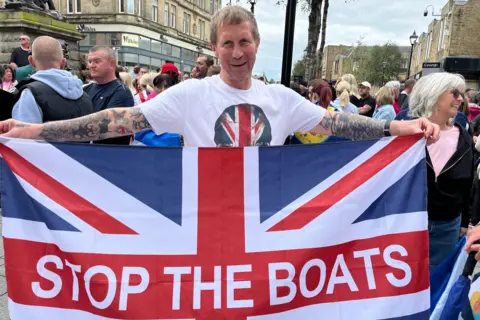
Mark was one of the protesters in Falkirk
"We're sick of these people rolling up in boats, getting four-star hotels," he told me.
"They're getting their three meals a day while Britain's services suffer. We're just sick of it and Starmer is not doing enough to try and stop it."
Minutes earlier one of the speakers had shouted: "Keep Britain white. Keep Scotland white. Keep Scotland Scottish."
Mark insisted the man did not speak for him, and that the protest was "nothing to do with racism".
Outside the hotel a group of counter-protesters, including many trade unionists, had gathered.
They too were critical of the prime minister – but for different reasons. They accused him of pandering to the far right.

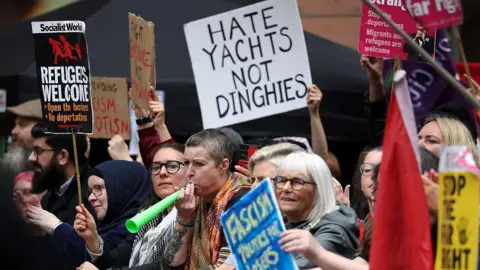 Getty Images
Getty Images
Counter-protesters demonstrated against a rally protesting about immigration in Glasgow earlier this month
The two camps appear to share a sense of disgust about the UK's ailing economy and the poor state of public services - although they do not necessarily agree on the causes or the solutions.
"The real issue in our society is the people in government who aren't tackling these issues head on, not people fleeing persecution trying to find a better place to live," said a counter protester in Falkirk, who gave her name as Sage.
Referring to the anti-asylum seeker protest across the road, she said: "I don't blame these people for falling for these narratives, because everyone is suffering.
"It doesn't matter what side of the political spectrum we're on, everyone is going through it."
The real problem, insisted Sage, was billionaires making record profits and not paying enough tax.
"We know who is underfunding our services. It's not migrants and refugees," she said.
One recurring complaint among protesters is about the number of migrants being housed at local authority expense.
The issue is most acute in Glasgow, which has the UK's highest number of refugees in council accommodation.
Asylum seekers are housed by the UK Home Office but, after they are granted leave to remain and become refugees, that support quickly expires.
At that point, many become homeless and, because Scottish councils have a statutory duty to house all homeless people, they must step in.
"Essentially, we have run out of temporary accommodation," said Glasgow City Council leader Susan Aitken.
"We don't have anywhere to put all of these people who are now declaring themselves homeless in the city, and we're having to put them up in hotels, and that's very, very expensive."

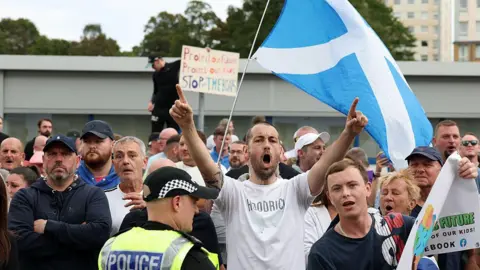 Getty Images
Getty Images
Protesters in Falkirk said they were opposed to housing asylum seekers in the town
The SNP councillor for Langside wants the UK government to step in but is at pains to stress that refugees do not have priority over anyone else.
Aitken added: "Anyone who is telling you that asylum seekers and refugees are prioritised by the SNP, by the Scottish government, or by this council is lying to you. It is simply not true."
Still, some hostility to immigrants persists and migration has risen up the list of Scottish voters' concerns as flags have appeared on lampposts around the country.
Hundreds of saltires have gone up in working class communities such as those in north and east Glasgow; Sighthill in Edinburgh; and Falkirk's Westfield.
Shawn, a refugee who lives in north Glasgow, believes the saltire usually represents peace, harmony and inclusion - but says it is now being flown "for the far-right and racism".
The former police officer and his mother Mala successfully sought asylum in the UK after they fled their South East Asian homeland in circumstances they asked not to discuss in public for their own safety.

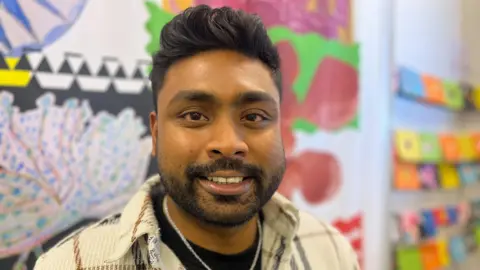
Shawn said he had experienced racism on the streets of Glasgow
Shawn, who runs a community organisation called the Springburn Unity Network, said he had been subjected to racist insults in Glasgow and knew immigrants who were afraid to leave their homes because of the recent protests.
Debates about flags are not just raging in Scotland's big cities and working class towns.
In the prosperous Renfrewshire village of Bridge of Weir, the hoisting of saltires has led to a row on the local Facebook group.
In the middle of the village, Dougie Moore told me he approved of the flags because they sent a message to immigrants that "they should be coming to enjoy our country the way that we enjoy it rather than changing things".
Bunty Singh, who owns a local café and delicatessen, said he had no issue with anyone flying a national flag but also insisted there were no problems with immigration in Bridge of Weir.
"It's a peaceful, lovely village," insisted Mr Singh who was born in Glasgow to parents who were originally from India.
"We're happy to be here and we are welcomed here."

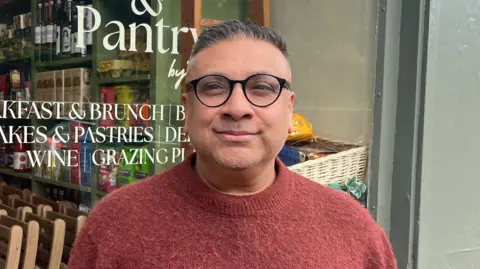
Bunty Singh said there were no problems with immigration in Bridge of Weir
But at a local community hub Ian Gillies was concerned about the saltires, which he regarded as unwelcoming and divisive.
"I think it's in keeping with the spirit of the age," he said.
"'Every man for himself and we don't want anybody else coming our way.' I see the same trend in the States and elsewhere in the continent. It's sad to see it coming here."
Mr Gillies is not the only person to note an Americanisation of politics on this side of the Atlantic in the age of Donald Trump and social media.
At the protest in Glasgow where Steven Rennie spoke about the saltire, there were chants, calls and placards in support of right-wing American influencer Charlie Kirk, who had been shot dead days earlier.
Later the crowd chanted "Oh Tommy, Tommy", in tribute to the convicted criminal and far-right activist Stephen Yaxley-Lennon, who uses the name Tommy Robinson and has been supported by Elon Musk.

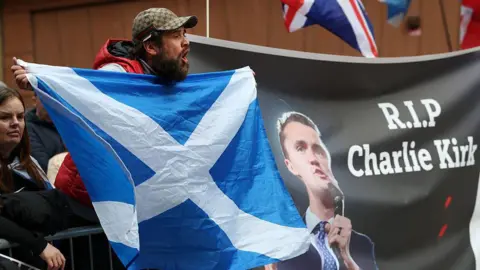 Getty Images
Getty Images
There were tributes to the late right-wing influencer Charlie Kirk at a demonstration in Glasgow
Matthew Feldman, a visiting professor at Liverpool Hope University and leading expert on the radical right, said he was concerned that extremism was bleeding into mainstream political debate because overt racism and the glorification of terrorism were "being given a pass" on US-owned social media platforms.
At the anti-migrant protest in Falkirk, one banner referenced former SNP first minister Humza Yousaf's calls for greater ethnic diversity in Scottish public life in a speech which had been highlighted and criticised by Musk and Reform UK leader Nigel Farage.
The same banner went on to quote a white supremacist slogan known as the 14 Words: "We must secure the existence of our people and a future for white children."
"The 14 Words actually comes from the eighth chapter of Mein Kampf," explained Prof Feldman.
He said the slogan was "a translation of Hitler's sense of Aryan supremacy" and was popularised in the US in the 1980s by the late white supremacist David Lane.
"It is inconceivable to me that somebody that is writing out that phrase doesn't associate it with white supremacism and, more importantly, with a sort of an anti or racist view towards ethnic and religious minorities," added Prof Feldman.

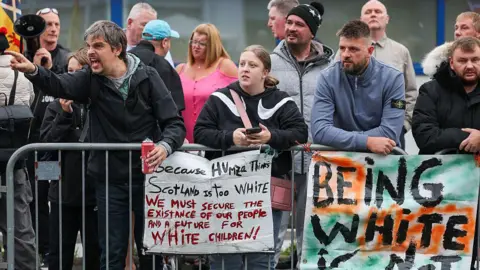 Getty Images
Getty Images
One banner at a protest in Falkirk contained a white supremacist slogan
It was not the only extreme language on display in Falkirk.
Another sign read "Kill 'Em All. Let God Sort 'Em Out," a phrase originally associated with a 13th Century Catholic crusade.
While not defending the placards, many of the protesters we spoke to insisted they had genuine concerns about the safety of women and children.
They pointed to the conviction of an Afghan asylum seeker for raping a 15-year-girl in the town and the arrest of a resident of the asylum hotel on sexual indecency charges, which he denies.
Farage has also suggested sexual assault by asylum seekers is a particular problem, a claim described by Glasgow City Council leader Susan Aitken as one of history's oldest and nastiest racist slurs.
When I spoke to Farage on a visit to Aberdeen earlier this year he insisted that Reform UK was now a serious contender in Scottish politics.
"I've spent a year going around England campaigning ahead of the English local elections, and perceptions of me and the party have changed over that last year, and I intend to make that happen in Scotland over the next year," he told me.
That claim may be bolstered by Reform's strong third place in June's Hamilton, Larkhall and Stonehouse by-election, which Labour won.
On Wednesday, Scotland's First Minister John Swinney said arguments about immigration were being "fanned by a wider debate" going on in the UK and around the globe.
The SNP leader told me he believed in a Scotland that was "tolerant, welcoming and inclusive" and urged people "to avoid us being swept down a route of a relentless rightward direction in the United Kingdom".
Swinney added: "I don't think that's where Scotland wants to be. I don't think that's how Scotland feels. And I want to make sure that people in Scotland realise that there is a danger that we will be carried down that route if we don't take a different course."
Polls ahead of May's Holyrood election suggest a big lead for the SNP, with Reform potentially overtaking the Conservatives to challenge Labour for second place, despite never before having won a seat at Holyrood.
Whatever flags are waved by whichever party in the campaign, immigration appears likely to take its place alongside the economy and public services as a big issue.

 2 hours ago
3
2 hours ago
3

